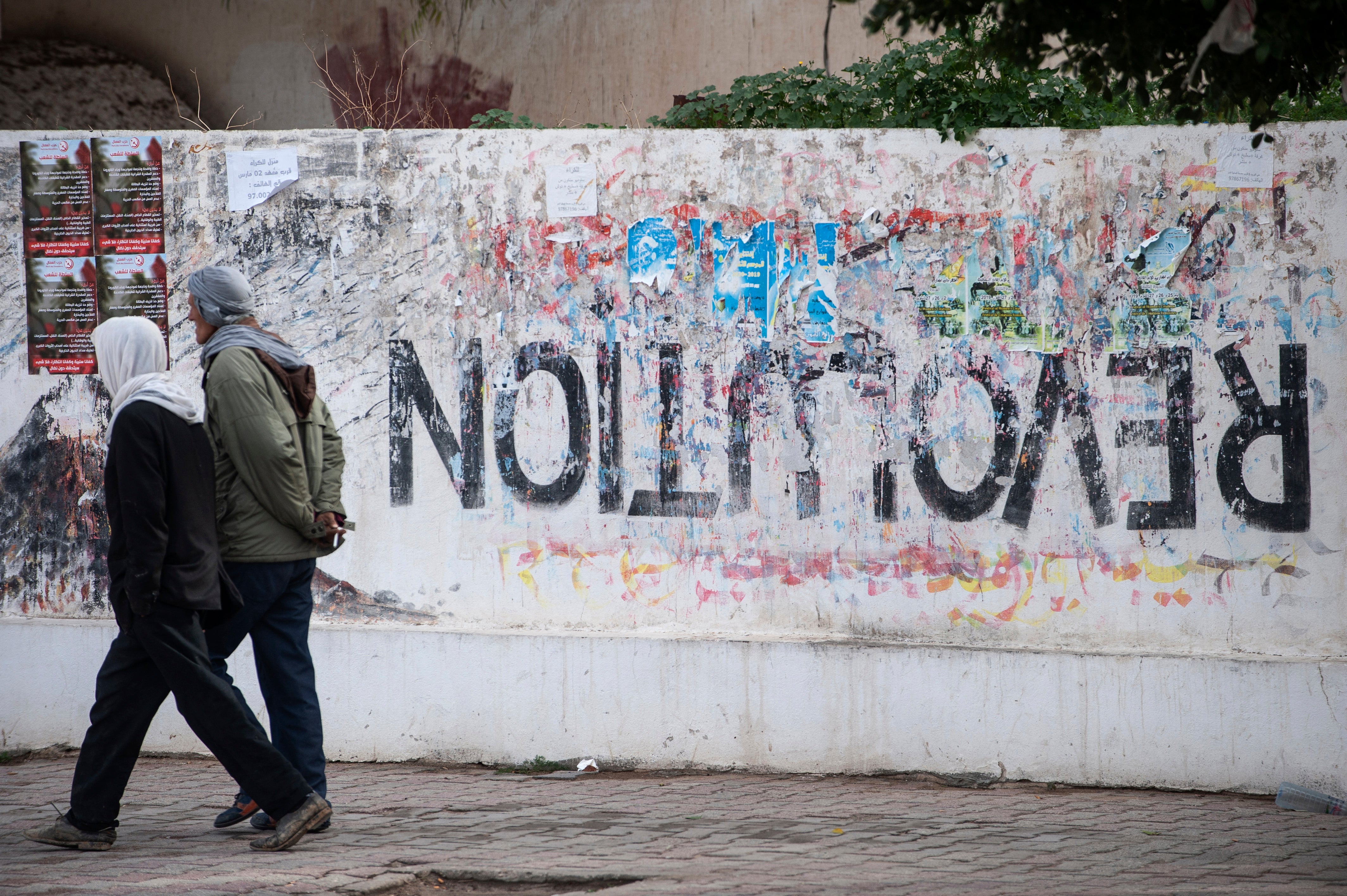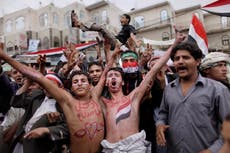A dream of freedom sparked Tunisia’s revolution. Ten years on, economic reality now threatens it
It is exactly a decade since protests in Tunisia started the Arab Spring movement, but life remains a struggle for those who took to the streets, reports Borzou Daragahi


When a young street vendor named Mohamed Bouazizi in the Tunisian backwater town of Sidi Bouzid set himself on fire on 17 December 2010, he started a revolution that would spread across his own country and later to much of the Middle East.
Back then, there was hope for change, a new era of prosperity and freedom. But 10 years later, that spectacular moment of joy and liberation has faded away to reveal a sober reality. A small country struggles to find its way despite economic stagnancy, persistent corruption, and stark political and cultural polarisation.
“They say we now have freedom of expression,” says Samar, a 32-year-old from Sidi Bouzid who was a student at the time of revolution. “It may be good. But for others, not for us. Not for the poor. It doesn’t give us enough to eat.”
Tunisia, a north African nation of 11.5 million people, has changed dramatically in the 10 years since Bouazizi’s suicidal act of desperation prompted a 25-day uprising that led to the ousting of the country’s longtime dictator, Zine el-Abedine Ben Ali.
The country has held numerous elections. It changed its entire form of government to strengthen parliament, and adopted a new constitution that enshrines civil liberties and women’s rights while limiting the power of the armed forces.
Tunisia suffered through an ongoing spate of terrorist attacks and assassinations. An estimated 6,000 Tunisians wound up joining Isis, perhaps the highest concentration of any country worldwide. Yet Tunisia managed to hand over power from an Islamist-led government to a secular-led one, and then brokered compromises between the two factions – a rarity in much of the world.
Its first elected president, Mohammed Beji Caid Essebsi, died while in office, and to the relief of Tunisians and the country’s international friends, an orderly succession process followed.
“Tunisia was a largely apolitical society where people discussed football, arts or daily life issues, but no one discussed politics,” said Yousef Cherif, a Tunis-based political analyst. “Now every person in the street has a say in politics, either through Facebook or public squares. This is the major difference. It’s the big change. It’s the major change.”
In a recent talk for the Middle East Institute about his new book, The Ardent Swarm, Tunisian novelist Yamen Manai contrasted the myth and reality of life in sun-blessed Tunisia under Ben Ali, who died in exile last year.
“The image that we had for long years of a touristic country where people came to spend their holidays,” he said. “They thought we were happy. But for most of Tunisians, it looked like a big jail. We didn’t have even the right to dream.”
Corruption pervaded. If you wanted to set up a business, you had to pay a share to the regime’s cronies. Bribes were commonplace. Artists weren’t allowed to speak. Textbooks were censored to exclude references to the aspirations for freedom and liberty that drove the country’s movement to win independence from France.
“We started sleeping for years and years,” he said.
On the day when Bouazizi set himself alight after a police officer shut down his fruit stand, it barely made even the local news. But anger over the young man’s fate, quickly boiled over into local demonstrations. It wasn’t until two days later that the news of mass protests and riots in the town of Sidi Bouzid made a brief mention in international news reports, or was even acknowledged by the government.
But in the meantime, industrious Tunisians were using newly ubiquitous smart phones to spread videos of the protests, a tactic that was repeated in subsequent uprisings that swept through North Africa and the Middle East.
They began in the hinterlands of towns like Sidi Bouzid and Kasserine, and spread to the coastal cities like the labour movement stronghold of Sfax and the capital Tunis, the centre of intellectual life.
By the time Bouazizi succumbed to his injuries at a hospital on 4 January, it was clear something extraordinary was happening in the country.
The speed of the regime’s collapse showed the flimsy nature of Ben Ali’s rule. On 14 January, the former interior minister and his family fled to Saudi Arabia, after being prompted to leave by his own army. Within days, Rachid Ghannouchi, the exiled leader of the Islamist-leaning Ennahdha Party, arrived in Tunis.
“The revolution has a very deep meaning for me,” Mr Ghannouchi said in an interview with The Independent. “Were it not for the revolution I would not be in my country today. The revolution is everything for me, and for my life, and also for generations of Tunsisians who have fought for freedom.”
The changes that took place afterward were momentous. Tunisia went from being one of the most static nations in the world to one of the most dynamic. Protests engulfed the capital and other cities. Islamists, secularists, and leftists struggled against each other.
But be sure that right now, if we all set fire to each other, nothing will change
Hundreds of new newspapers were launched, along with political parties and civil society groups. Tunisia emerged as a centre of Arab political change and reform, with think tanks and democracy promotion groups from abroad turning it into their headquarters.
And still, even 10 years later, there has been little change in the rigid divisions that criss-cross Tunisian society. Old prejudices remain. The coastal cities remain wealthy and cosmopolitan. The interior is poor and inward-looking. Both sides eye each other with suspicion and prejudice.
Islamists say one thing on the floor of parliament and to the international media, while continuing to feed the extremism of some of their supporters who hunger for Muslim rule via social media and local forums. Francophonic secularists and self-described liberals accuse Islamists and their supporters of being ignorant sheep.
“The left and the liberal secular bourgeoisie did not evolve at all,” said Mr Cherif. “That liberal secular section is still in the same mindset as four years or 10 years ago.”
There are also new and potentially dangerous forces emerging among the secularists : a populist-sounding movement likely backed by the United Arab Emirates and given a platform on Gulf media that argues the the revolution was a mistake, and that a return to the type of strongman rule exemplified by Egyptian president Abdel-Fattah el-Sisi was preferable to a messy democracy.
“They are Tunisian right-wingers who say the Arab Spring was a big conspiracy,” said Mr Cherif. “A lot of secular Tunisians might end up voting for these populist pro-authoritarian groups even if they believe democracy is better than dictatorship.”
Even in Sidi Bouzid, there are those who have become so frustrated over rising costs and diminishing economic power that they rue the day Bouazizi set himself alight.
“He was desperate; now a whole people are,” said Mohamed Ali, a 41-year-old grocer in Sidi Bouzid. “But be sure that right now, if we all set fire to each other, nothing will change. No one will move a finger. There are those who go so far as to insult him when they see how much the prices have gone up! They say it's because of him. Nothing has actually changed except the prices.”
He added that although he never liked Ben Ali, life was better under his rule. “We were able to manage the day-to-day,” he said.
Tunisia’s economy has suffered greatly over the last 10 years, with international investors spooked by the political instability. The coronavirus pandemic is hurting even more than expected, according to the World Bank, which says that the country’s economy contracted by a staggering 21 per cent and youth unemployment shot up to nearly 20 per cent in the second quarter of 2020. Tourism revenues have declined 47 per cent and exports are down by 27 per cent as of the middle of this year. Government debt has soared, limiting potential public spending.
The country is currently in talks with the International Monetary Fund for more financial assistance, and is also in discussions with China-led development banks.
Mr Ghannouchi said that the revolution achieved its first aim of winning political freedom for the country. Tunisia is widely celebrated as the sole success of the Arab Spring for a transition to democracy that is among the fastest worldwide in recent history.
But economic success remains elusive.
“Mohamed Bouazizi’s generation was deprived of freedom and lived under a dictatorship which was what allowed the police to deprive him of a basic thing like a vegetable cart that allowed him to make money,” he said.
“The challenge today is the generation that came after Bouazizi who never lived under dictatorship and who actually opened their eyes in the context of freedom,” he said.
What they lack now isn’t the ability to speak out or join the political process but economic prosperity, jobs, education, healthcare, and public services, he said. “And what hasn’t been achieved today threatens to undermine the achievements that have been made.”
Additional reporting by Ezer Mnasri in Tunis
Join our commenting forum
Join thought-provoking conversations, follow other Independent readers and see their replies
Comments


Bookmark popover
Removed from bookmarks